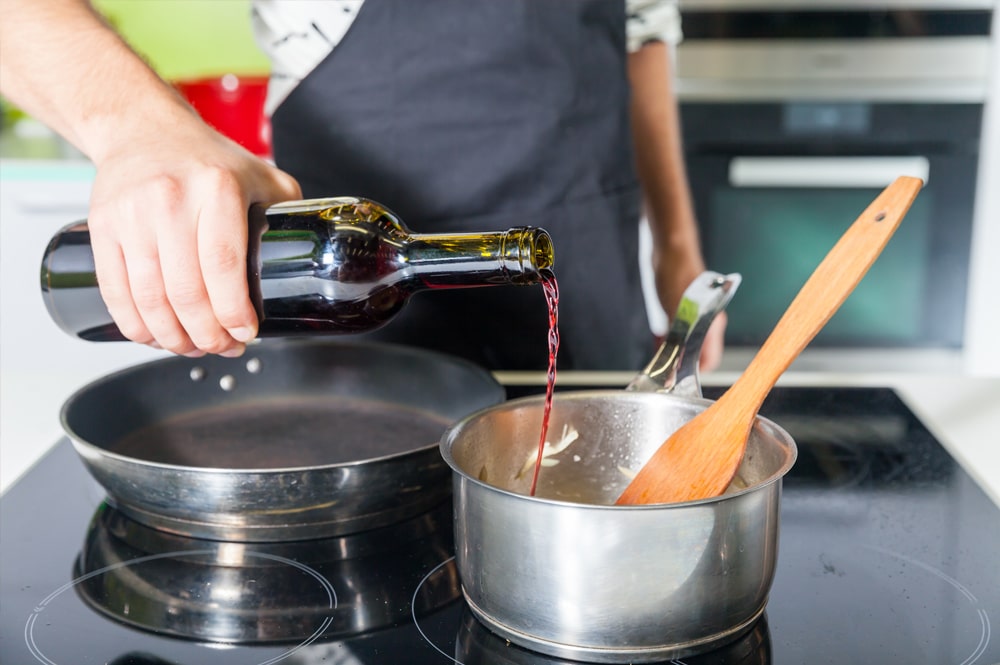Your Cart is Empty
Free US Shipping
Free US Shipping
When you run out of your favorite drinking wine, it's natural to wonder whether you can drink cooking wine instead. You may be thinking, "wine is wine," but is that really true?
People can drink cooking wine, but cooking wine was not created for this purpose. It was created to be used in food. There are several ingredients in cooking wine that make it unpleasant to the taste buds, which is enough to discourage most people from drinking it.
If you're adding some cooking wine to your famous tomato bisque and you're considering a swig- stop! Keep reading to find out more about what happens when you drink cooking wine.
You can technically drink cooking wine, as it is edible. However, you may not want to drink it once you realize what's in it.

Most cooking wines are formulated like cheap versions of the wines you love to drink. These cooking wines will have some of the good qualities of drinking wine, but this will not make up for the differences between the two.
If you drink cooking wine, you are in for an unpleasant surprise. While cooking wine does have alcohol, it differs from drinking wine in the following ways:
Imagine a sugar-free, salty, preservative-packed wine. This is not something that you want to drink.
While there are some distinct differences between cooking wine and drinking wine, there is one main similarity. Both cooking wine and drinking wine have alcohol. In general, cooking wine is about 16% ABV. However, this can vary depending on the brand of cooking wine you have at home.

If you know a bit about the alcohol content in wine, you'll notice that the alcohol content in cooking wine is slightly higher than alcohol levels in drinking wine. There is a reason for this. Since the wine will be used in cooking, most of the alcohol will be burned off as you cook your meal.
Anyone can buy cooking wine, and this is because it is designed to be unfit for beverage use. Cooking wine must have a warning inscribed on its label, indicating that it is for cooking and not drinking.
Yet, underage kids still buy this wine simply for its alcohol content. While this is unfortunate, there is no law that states that you must be a certain age to purchase cooking wine.
Even though it is formulated with preservatives, cooking wine does eventually go bad. To check if your wine has gone bad, you should take a look at the packaging for a printed expiration date. Most cooking wines are good for several years, but this can vary based on the brand and type of wine you bought. So, the best thing to do to be sure is to check the bottle.
If there is no date on the bottle, and you remember when you bought it, you can call the company that makes the wine. They will be able to give you more information about how long you can expect the wine to last.
You should also consider whether you've already opened the bottle. If it is opened, it may last up to one year. However, if you did not refrigerate your cooking wine after opening it, it may become unfit to use sooner.
Drinking a little cooking wine will not kill you, but there are health risks associated with drinking large amounts of it.
Since the alcohol content in cooking wine is on par with a bottle of Cabernet, from a drunkenness standpoint, you can get drunk from consuming this wine. If you drink a ridiculous amount of it, you can pass out and suffer serious health consequences.
Besides, if you drink copious amounts of cooking wine, you could develop liver issues, which could have life-threatening complications. This is also true of drinking wine.
Another problem with drinking cooking wine is its high sodium content. If you drink a really high salt volume, you could suffer health problems, specifically with your heart. If you already have a heart condition, it is advised not to drink large quantities of cooking wine.
Chances are you won't be able to drink enough cooking wine to cause severe health effects- it tastes that bad.
Top food and restaurant experts will tell you that cooking wine is not good for cooking either. This is because of some of the same reasons you wouldn't want to drink it.

Cooking wines, especially the commercial varieties sold in your local market, have the potential to ruin your favorite dishes. The high salt content in the cooking wine can easily make your dish too salty, and some brands of cooking wine have ingredients in them that can lead to a metallic taste in your food.
Most cooking wines are made with low-quality wine that doesn't add much character to your food.
Authorities in the food industry recommend that you get cooking wine out of your kitchen immediately and use drinking wine instead. Below are some tips for choosing a good wine for cooking:
Using drinking wine for cooking, instead of cooking wine, can be a money saver since you can drink the same wine you end up using in your meal. If you end up having some leftover, make sure you use it up before it goes bad.
Now you know that, even though you can technically drink cooking wine, it is not recommended. You also have some tips to bring your cooking to the next level using drinking wine in your dishes. We hope that this article helps you with all of your cooking wine concerns.
